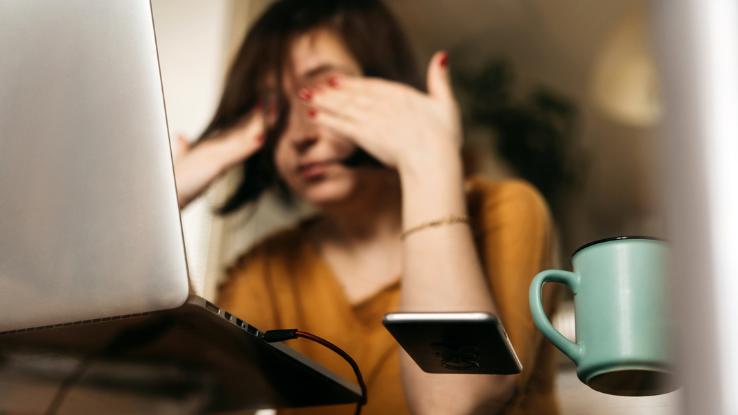
We’ve been living with burnout long before we had a word for it. Burnout was a term first coined in 1970 by American Psychologist, Herbert Freudenberger. A Holocaust survivor raised by abusive family members, Freudenberger had certainly been exposed to tremendous amounts of ongoing stress. When fatigue and depression left him unable to attend a family vacation, he began analyzing his own state, speaking into his tape recorder saying, “I don’t know how to have fun. I don’t know how to be readily joyful.” He called his condition burnout.
In 2019 the World Health Organization added burnout to the International Classification of Diseases, classifying it not as a disease but as “a syndrome conceptualized as resulting from chronic workplace stress that has not been successfully managed.” This new definition, not of a disease, but as a syndrome with which many workers can identify, is helping to reduce stigma and increase help seeking. Burnout results from prolonged periods of stress— specifically resulting from stressors over which individuals feel little control (think pandemic, global warming, political polarization— you get the picture). It’s helpful to know that you’re not along in your experience of burnout, and that there are things you can do to help.
What Is Causing Burnout?
Professor of neuroscience and psychology at Yale, Amy Arnsten explains that prolonged exposure to uncontrollable stress negatively impacts our frontal lobe— the part of our brain that handles planning, organizing, multi-tasking, and controlling our emotions. At the same time, more primitive parts of our brain designed to identify threats, are strengthened. As a result, it becomes harder to regulate negative emotions, and experiences of emotional exhaustion are common.

While workplace stress is, of course, a contributing factor, as mentioned above, stressors unrelated to work can also affect our levels of burnout. As many of us have discovered, burnout can happen even when we’re working from home. A survey conducted by Eagle Hill Consulting found that almost half of U.S. employees who worked during the pandemic have experienced burnout, and about 25% of them blame the virus alone for these emotional changes.
Stages of Burnout: Exhaustion and Dwindling Enthusiasm
One major sign of burnout is emotional and physical exhaustion. Your ability to cope with job-related stress is reduced, and so stress at work becomes extra challenging and is accompanied by fatigue. Insomnia, troubled sleep, and excessive sleeping are all signs that your stress levels are high, which could mean you’ve burned out due to stress. Often, in response to this fatigue, people will push themselves to work harder, which can set in motion a detrimental cycle.

Feeling unenthusiastic about work is another clear sign of burnout. Working from home can aggravate this issue. Without a set work schedule — and in the absence of the need to shower in the morning and put on work clothes — it’s become a challenge to stay dedicated to what we need to accomplish. But not only work-from-home workers experience lack of enthusiasm.
Stages of Burnout: Negativity Toward Your Job
Outright negativity toward your job means it’s very possible you are burned out, especially if you previously enjoyed your job. You may find yourself feeling hostile towards your co-workers and collaborators, while at the same time feeling singularly focused on work and neglecting hobbies and time with family and friends.These negative feelings pile up too, ultimately leading to additional stress and frustration.

If neglecting your needs or an inability to set work/life boundaries is part of the first stage of burnout, depersonalization is part of the second stage. When we experience depersonalization, we lose the ability to recognize our own needs and to perceive whether or not they are being met.
Stages of Burnout: Decreased Job Performance
Burnout can easily lead to faltering productivity, both in your work and in your personal life. Compounding factors like exhaustion, frustration, and lack of clear direction will generally make your productivity decline. Increased restlessness, anxiety, and depression can all accompany burnout, and will effect your professional efficacy.

Burnout, when not addressed early, can manifest in extreme ways. Founder of the Huffington Post, Arianna Huffington, has been outspoken regarding her experience of burnout, which ultimately resulted in her collapsing in her office, hitting her head and breaking her cheek as she fell. But you don’t need to get to this stage of burnout to begin taking action (and we hope you don’t!).
Solutions to Help Manage Pandemic Burnout
Fortunately, there are steps you can take to ease the pain caused by burnout. Keeping yourself mentally healthy is not only good for your morale— it could also help keep your immune system in top shape.

It’s also nice that many of these burnout solutions work well as general stress-reducing tactics you can utilize well into the future — it certainly never hurts to be armed with tools to boost your mental health any time.
Be Honest About Your Ability to Be Productive
The pressure of productivity can be intense, and as we just explained, can often cause stress that will only result in less productivity. This can become a vicious cycle. Rather than putting more pressure on yourself to increase your productivity, you might instead try to disrupt this cycle by setting realistic expectations with yourself and others.

You can reduce feelings of being overwhelmed when you’re honest, first with yourself and then with your boss. Recognizing what you can realistically get done in a day or a week helps with managing expectations. As a result, realistic expectations lead to decreased stress.
Create a Separate Workspace
This suggestion is specifically for those work-from-home workers. While turning a room into a home office still may not be realistic, getting a desk and creating an enclosed space where you can work can help you create healthy boundaries between work life, home life, productivity, and relaxation.

These boundaries are necessary for maintaining your mental well-being. A space that you use solely for productivity also helps you minimize distractions. Telling family members that this area is off-limits to them while you’re working gives you a better chance of staying focused while you work.
Set Boundaries for Work Hours
It is important to leave work each day, and this doesn’t just mean leaving your physical workplace. This can mean creating a schedule of work hours that you actually follow, if you have a job with a lot of flexibility. Additionally, you might turn off work-related notifications on your devices outside of work hours. Setting this boundary will allow you to unplug from your job and provide some mental space for relaxation.

In turn, you can recharge to be on top of your game and at your most productive when you return to work the next day. It might not be long before you notice some of your burnout symptoms disappearing as you maintain a clear work schedule for yourself.
Name Your Ailments
If you recognize your issues, they can become easier to manage, and that can provide some relief from burnout symptoms. You can do this by naming your emotions when you experience them. Labeling them helps move the problem from something vague to something very specific that you can address.

If you’re feeling restless, acknowledge the restlessness so you can figure out how to get rid of it. If you’re feeling exhausted, call it what is, and the solution will be easier to find. If you don’t recognize the problem, then it can become much more difficult to figure out how to solve it.
Ask for Help When You Need It
When you’re struggling with anything, including burnout, asking for help can be one of the more beneficial ways to relieve some of your emotional challenges. The trick is to ask the right people based on your needs. If you need help with chores around the house and a family member is capable of helping, ask them directly to assist you.

If you need help with something job-related, talk to your boss or co-workers. Most people are happy to help when they know someone is struggling. It may not be easy to ask for help, but it’s definitely better in the long run than dealing with the negative consequences of going through it alone.
Meditate
Meditation works to free your mind of the constant swirling thoughts that most people are having during this very strange and stressful time. It has great potential to help with anxiety so you can get back to being your better self.

For basic meditation, all you have to do is sit down, close your eyes, breathe in and out deeply, and only think about your breathing and nothing else. You can do this for as long as you want, keeping in mind that the best results come from meditating for at least a couple of minutes.
Commit to Some Form of Exercise
Exercising is good for both your body and your mind, and it can really help limit burnout and anxiety. Cardio exercise that gets your heart pumping prompts your brain to release mood-lifting endorphins. Moderate- to fast-paced cardio also works as a stress reliever, as it forces you to think more about your body and less about what’s running through your mind.

Yoga and other forms of light exercise, such as stretching, can have positive results for relieving burnout as well. Even if you can only commit to 15 minutes a day, that’ll start the journey to getting your mind back to feeling healthy again.
Talk About Your Feelings with Someone
As we mentioned above, there are a tremendous amount of stressors facing all of us right now. Whether you’re lonely from isolation, fearful about the long-term repercussions of a faltering economy, or facing down climate dread, it’s all a lot to deal with emotionally right now.

This is the time to lean on family, friends, and mental health professionals for emotional support. Talk to them about your feelings. This digital age comes fully equipped with a plethora of electronic options for reaching out to each other for the support we need. Vaccinated individuals may be able to enjoy face-to-face moments with other vaccinated loved ones so long as health guidelines are consistently followed.
Above All Else — Go Easy on Yourself
It’s normal for you to feel anxiety and worry about the future. Don’t punish yourself for these responses. Accept them, and figure out the steps you can take to relieve them.

Don’t push yourself too hard or even as hard as you did before these symptoms came forward. The stress of living through this time is a lot to handle, and your biggest priority should be taking care of yourself, not being hard on yourself. Productivity isn’t the only measure of success — happiness is critical too.






